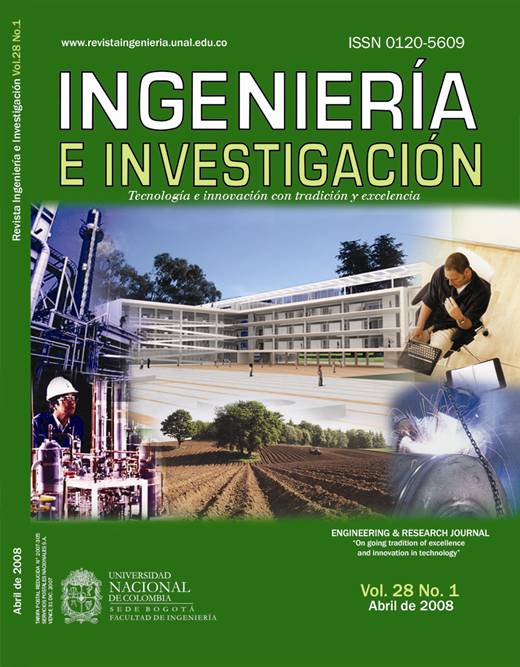Exploiting stock data: a survey of state of the art computational techniques aimed at producing beliefs regarding investment portfolios
El valor de las series de tiempo de acciones: un estado del arte de técnicas computacionales para la generación de expectativas en portafolios de inversión
DOI:
https://doi.org/10.15446/ing.investig.v28n1.14873Keywords:
portfolio, optimisation, stock, securities, return, risk, profile, belief, rules set (en)portafolio, optimización, acciones, títulos valor, retorno, riesgo, expectativas, conjunto de reglas (es)
Downloads
Selecting an investment portfolio has inspired several models aimed at optimising the set of securities which an investor may select according to a number of specific decision criteria such as risk, expected return and planning horizon. The classical approach has been developed for supporting the two stages of portfolio selection and is supported by disciplines such as econometrics, technical analysis and corporative finance. However, with the emerging field of computational finance, new and interesting techniques have arisen in line with the need for the automatic processing of vast volumes of information. This paper surveys such new techniques which belong to the body of knowledge concerning computing and systems engineering, focusing on techniques particularly aimed at producing beliefs regarding investment portfolios.
El proceso de selección de portafolio ha dado origen a diferentes modelos, orientados a optimizar el conjunto de títulos valor disponibles para un inversionista, con base en diferentes criterios de decisión tales como el riesgo, el retorno esperado, horizonte de planeación, entre otros. El enfoque clásico de estos modelos cubre las dos fases del proceso de selección de portafolio, y está definido por disciplinas tales como la econometría, el análisis técnico y las finanzas corporativas. Pero el nacimiento de la computación financiera define el uso de nuevas técnicas bajo la necesidad del procesamiento automático de grandes volúmenes de información. Este artículo es un estado del arte de esas nuevas técnicas, desde el punto de vista de la ingeniería de sistemas y sus modelos computacionales, aplicados particularmente a la generación de expectativas de inversión en portafolios.
References
Amir, R., Evstigneev, I. V., Hens, T., ReinerSchenk-Hopp, K., Market selection and survival of investment strategies., Tech. Rep. 02-16, University of Copenhagen. Institute of Economics, Oct. 2002, available at http://ideas.repec.org/p/kud/kuiedp/0216.html.
Artzner, P., Delbaen, F., Eber, J., Heath, D., Coherent measures of risk., Mathematical Finance, Vol. 9, 1999, pp. 203–228. Berkhin, P., Survey of clustering data mining techniques., technical report, Accrue Software, San Jose, CA, 2002. DOI: https://doi.org/10.1111/1467-9965.00068
Burmesteir, E., Roll, R., Ross, S., Using ma croeconomic factors to control portfolio risk., tech. rep., Insightful, 2003.
Cao, L., Tay, F., Financial forecasting u sing support vector machines., Neural and Computing Applications, Vol. 10, 2001, pp. 184-192. DOI: https://doi.org/10.1007/s005210170010
Chan, M.-C., Wong, C.-C., Lam, C.-C., Financial time series forecasting by neural network using conjugate gradient learning algorithm and multiple linear regression weight initialization., Department of Computing, The Hong Kong Polytechnic University.
Chen, N.-F., Roll, R., Ross, S. A., Economic forces and the stock market., Journal of Business, Vol. 59, No. 3, pp. 383-403, 1986. available at http://ideas.repec.org/a/ucp/jnlbus/v59y1986i3p383-403.html. DOI: https://doi.org/10.1086/296344
Cheng, C.-H., Entropy-based subspace clustering for mining numerical data., Master’s thesis, Department of Computer Science & Engineering, Chinese University of Hong Kong, 1999. DOI: https://doi.org/10.1145/312129.312199
Chung Fu, T., Lai Ching, F., Luk, R., man Ng, C., Financial time series indexing based on low resolution clustering. Clements, M. P., Forecasting economic and financial time series with non-linear models., Department of Economics University of Warwick, October 2003.
Craighead, S., Klemesrud, B., Stock selection based on cluster and outlier analysis. Nationwide Financial.
Darbellay, G. A., Wuertz, D., The entropy as a tool for analysing statistical dependences in financial time series., Physica A, D. Vol. 287, No. 3-4, 2000, pp. 429–439. DOI: https://doi.org/10.1016/S0378-4371(00)00382-4
Deng, X.-T., Wang, S.-Y., Xia, Y.-S., Criteria, models and strategies in portfolio selection,” AMO -Advanced Modeling and Optimisation., Vol. 2, No. 2, 2000, pp. 79-103.
Dose, C., Cincoti, S., Clustering of financial time series with application to index and enhanced-index tracking portfolio., tech. rep., Universit di Genova.
Dunis, C., Jalilov, J., Neural network regression and alternative forecasting techniques for predicting financial variables., tech. rep., Liverpool Business School, 2001, pp. 15
Ekern, S., Taxation, political risk and portfolio selection., Economica, Vol. 38, No. 152, 1971, pp. 421–30, available at http://ideas.repec.org/a/bla/econom/v38y1971i152p421-30.html. DOI: https://doi.org/10.2307/2551882
El-Yaniv, R., Competitive solutions for online financial problems., ACM Computing Surveys, Vol. 30, pp. 28–69, Mar. 1998. DOI: https://doi.org/10.1145/274440.274442
Gavrilov, M., Anguelov, D., Indyl, P., Motwani, R., Mining the stock market: Which measure is best?., tech. rep., Department of Computer Science- Stanford University.
Giles, C. L., Lawrence, S., Tsoi, A. C., Rule inference for financial prediction using recurrent neural networks., in Proceedings of IEEE/IAFE Conference on Computational Intelligence for Financial Engineering (CIFEr), (Piscataway, NJ), IEEE, 1997, pp. 253–259.
Giorgi, E. D., A note on portfolio selection under various risk measures., Tech. Rep. iewwp122, Institute for Empirical Research in Economics - IEW, 2002. available at http://ideas.repec.org/p/zur/iewwpx/122.html.
Glavan, C. An application of alternative risk measures to trading portfolios., Master’s thesis, Finance School, Zurich University, 2004.
Goldberg, D., Genetic algorithms in search, optimisation and machine learning., Addison-Wesley Professional, 1989.
Han, J., Kamber, M., Data Mining: Concepts and Techniques., San Francisco: Morgan Kaufmann Publishers, 2001.
Heckerman, D., Bayesian networks for data mining., Data Mining and Knowledge Discovery, Vol. 1, No. 1, 1997, pp. 79-119. DOI: https://doi.org/10.1023/A:1009730122752
Hellstrom, T., Holmstrom, K., Predicting the stock market., Tech. Rep. IMa-TOM-1997-07, Center of Mathematical Modelling - Malardalen University, August 1998a.
Hellstrom, T., Holmstrom, K., Predictable patterns in stock returns., Tech. Rep. HEV-BIB-OP-30-SE, Center of Mathematical Modelling - Malarden University, 1998b.
Hernandez, G., Linares, M., Rojas, S., On candlestick forecasting with an adaptive coupled dual neural network., in Memorias Congreso Internacional de Inteligencia Computacional CIIC 2007, 2007.
Hetland, M. L., Saetrom, P., Evolutionary rule mining in time series databases., Machine Learning, Vol. 58, Feb 2005, pp. 107-125. DOI: https://doi.org/10.1007/s10994-005-5823-8
Hutchinson, J. M., A radial basis function approach to financial time series analysis. Tech. Rep. AITR-1457, Massachusetts Institute of Technology, 1993.
Kaboudan, M., Genetic programming prediction of stock prices,” Computational Economics., M. ol. 16, 2000, pp. 207- 136. DOI: https://doi.org/10.1023/A:1008768404046
Kodogiannis, V., Lolis, A., Forecasting financial time series using neural networks and fuzzy system-based techniques., Neural Computing and Applications, Vol. 11, 2002, pp. 90-102. DOI: https://doi.org/10.1007/s005210200021
Kommo, Y. H., Mean-absolute deviation model for portfolio optimisation and its application to Tokyo stock market., Management Science, Vol. 37, 1991, pp. 519–531. DOI: https://doi.org/10.1287/mnsc.37.5.519
Koza, J., ed., Genetic Programming: On the Programming of Computers by Means of Natural Selectio., The MIT Press, 1992.
Markowitz, H., Portfolio selection., Journal of Finance, Vol. 7, 1952, pp. 77–91. DOI: https://doi.org/10.1111/j.1540-6261.1952.tb01525.x
Lendasse, A., Bodt, E. D., Wertz, V., Verleysen, M., Nonlinear financial time series forecasting-application to the bel 20 stock market index., European Journal of Economic and Social Systems, Vol. 14, 2000, pp. 81–91. DOI: https://doi.org/10.1051/ejess:2000110
Lendasse, A., Verleysen, M., de Bodt, E., Forecasting time series by kohonnen classification., in European Symposium on Artificial Neural Networks 1998 proceedings, 1998.
Markowitz, H., The early history of portfolio theory: 1600- 1960., Financial Analyst Journal, 1999. DOI: https://doi.org/10.2469/faj.v55.n4.2281
Micciche, S., Abd, F., Mantegna, R. N., Correlation-based hierarchical clustering in financial time series., 1995.
Muller, K., Smola, A., Vapnik, V., Using support vector machines for time series prediction., tech. rep., Image Processing Services Research Lab. Murphy, J., Technical analysis of the financial markets., New York Institute of Finance, 1999. DOI: https://doi.org/10.7551/mitpress/1130.003.0019
Nawrocki, D., A brief history of downside risk measures. Villanova University. Pawlak, Z., Rough sets., International Journal of Information and Computer Sciences, Vol. 11, 1982, pp. 341–356. DOI: https://doi.org/10.1007/BF01001956
Rombouts, J., Rengifo, E., Dynamic optimal portfolio selection in a var framework., Tech. Rep. 04-05, HEC Montreal, Institut d’conomie applique, July 2004, available at http://ideas.repec.org/p/iea/carech/0405.html. DOI: https://doi.org/10.2139/ssrn.882795
Rydberg, T. H., Realistic statistical modelling of financial data., Internat. Statist. Rev., Vol. 68, 2000, pp. 233–258. DOI: https://doi.org/10.1111/j.1751-5823.2000.tb00329.x
Sharpe, W., Capital asset prices: A theory of market equilibrium under conditions of risk., Journal of Finance, Vol. 19, 1964, pp. 425–442. DOI: https://doi.org/10.1111/j.1540-6261.1964.tb02865.x
Shen, L., Loh, H. T., Applying rough sets to market timing decisions., Decis. Support Syst., Vol. 37, No. 4, 2004, pp. 583–597. DOI: https://doi.org/10.1016/S0167-9236(03)00089-7
Shenoy, C., Shenoy, P. P., Bayesian network models of portfolio risk and return., The MIT Press, 2000.
Tay, F., Cao, L., Application of support vector machines in financial time series forecasting., The International Journal of Management Science, vol. 29, 2001, pp. 309–317. DOI: https://doi.org/10.1016/S0305-0483(01)00026-3
Van der Hart, J., Slagter, E., Van Dijk, D., Stock selection strategies in emerging markets., Tech. Rep. 01-009/4, Tinbergen Institute, Jan, 2001, available at http://ideas.repec.org/p/dgr/uvatin/20010009.html.
William, J. B., Theory of investment value. Harvard University, 1938.
Yao, J., Tan, C. L., Poh, H.-L., Neural networks for technical analysis: A study on KLCI., International Journal of Theoretical and Applied Finance, Vol. 2, 1999, pp. 221- 241. DOI: https://doi.org/10.1142/S0219024999000145
How to Cite
APA
ACM
ACS
ABNT
Chicago
Harvard
IEEE
MLA
Turabian
Vancouver
Download Citation
License
Copyright (c) 2008 Mario Linares Vásquez, Diego Fernando Hernández Losada, Fabio González Osorio

This work is licensed under a Creative Commons Attribution 4.0 International License.
The authors or holders of the copyright for each article hereby confer exclusive, limited and free authorization on the Universidad Nacional de Colombia's journal Ingeniería e Investigación concerning the aforementioned article which, once it has been evaluated and approved, will be submitted for publication, in line with the following items:
1. The version which has been corrected according to the evaluators' suggestions will be remitted and it will be made clear whether the aforementioned article is an unedited document regarding which the rights to be authorized are held and total responsibility will be assumed by the authors for the content of the work being submitted to Ingeniería e Investigación, the Universidad Nacional de Colombia and third-parties;
2. The authorization conferred on the journal will come into force from the date on which it is included in the respective volume and issue of Ingeniería e Investigación in the Open Journal Systems and on the journal's main page (https://revistas.unal.edu.co/index.php/ingeinv), as well as in different databases and indices in which the publication is indexed;
3. The authors authorize the Universidad Nacional de Colombia's journal Ingeniería e Investigación to publish the document in whatever required format (printed, digital, electronic or whatsoever known or yet to be discovered form) and authorize Ingeniería e Investigación to include the work in any indices and/or search engines deemed necessary for promoting its diffusion;
4. The authors accept that such authorization is given free of charge and they, therefore, waive any right to receive remuneration from the publication, distribution, public communication and any use whatsoever referred to in the terms of this authorization.



























